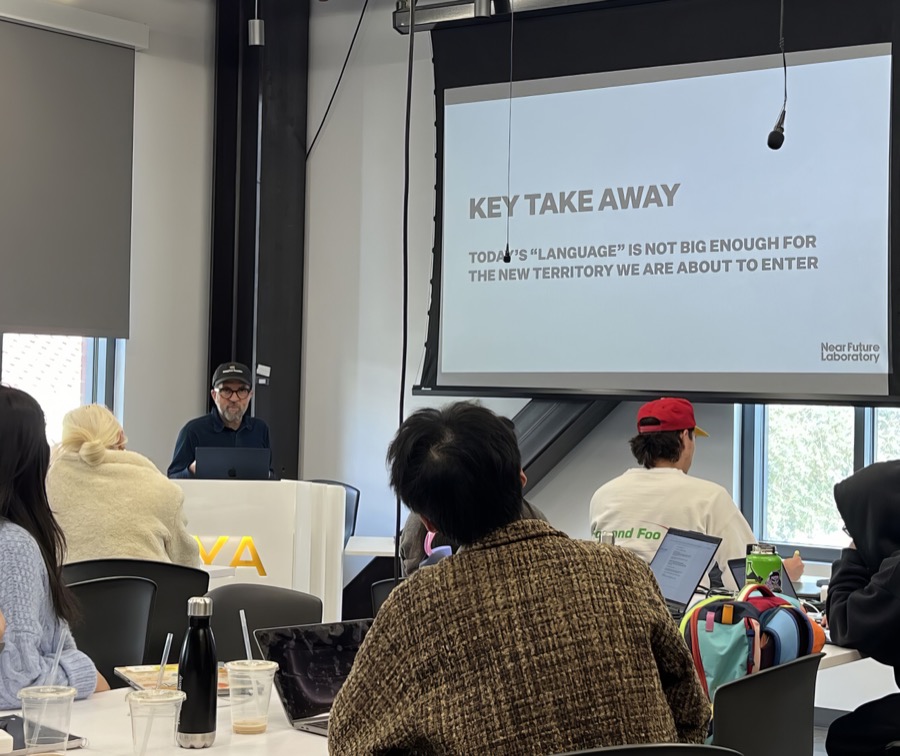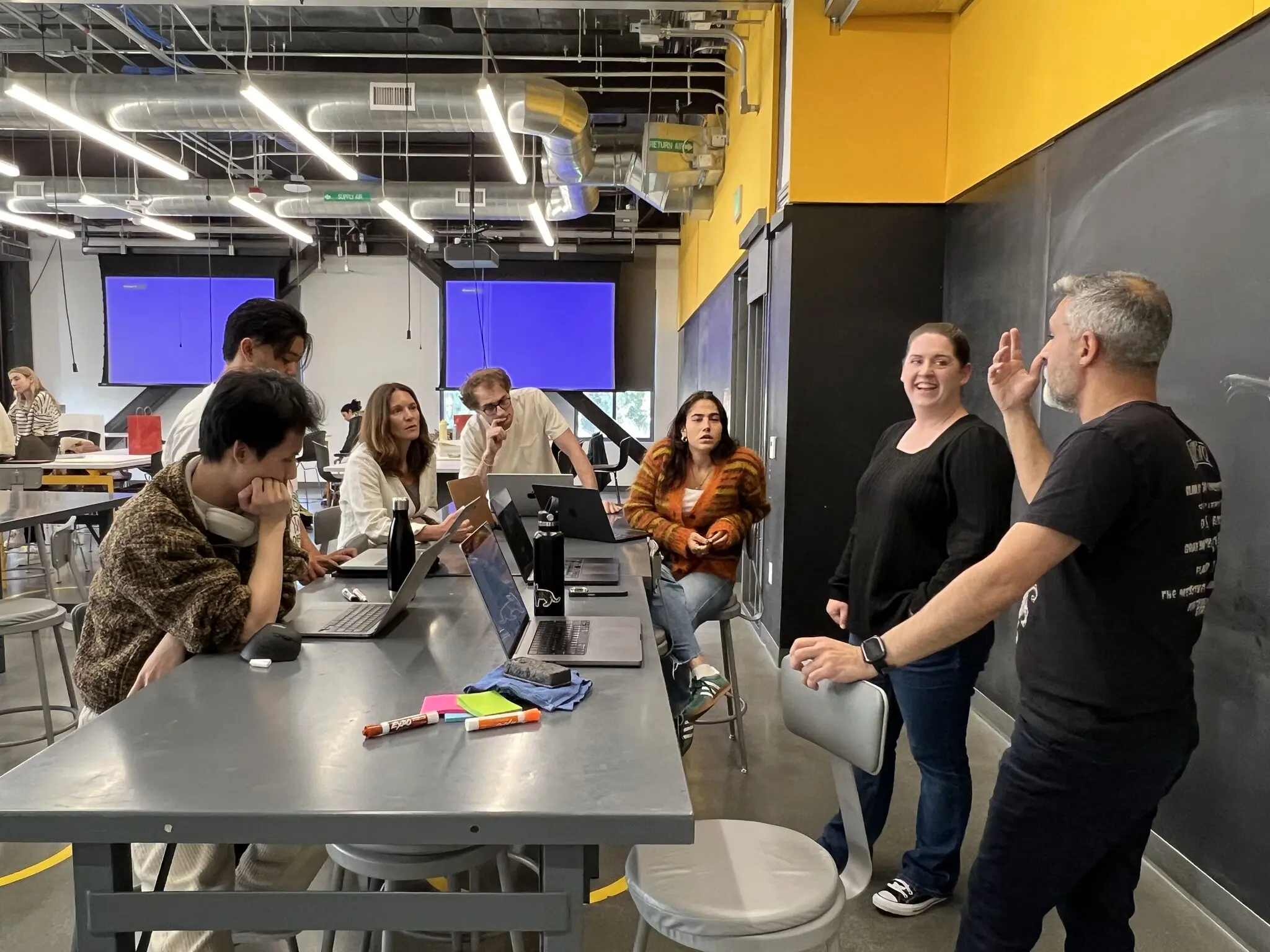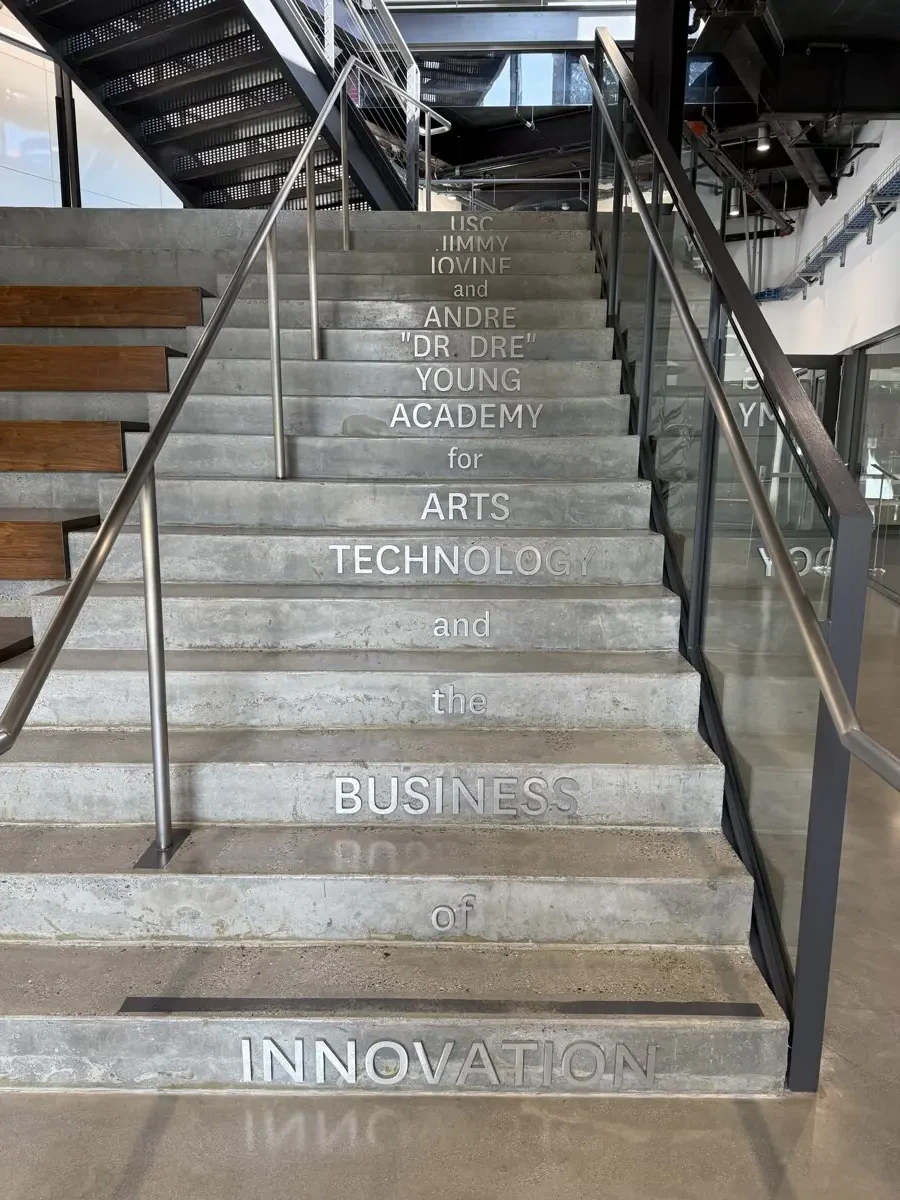
After a brief brief from Yihun, I knew exactly what to share with them — my OMATA case study. That's the one where I created an Annual Report from the Future of the company *rather than a traditional landscape-oriented, 11 slide PowerPoint pitch deck.
Why did it occur to me to share that?
This was an audience of folks eager to find the way to connect the futures-oriented perspectives they were developing in the workshop to the grounded practice of "innovation". This wasn't about a purely creative exercise disconnected from the expectations that "innovation" be actionable rather than speculative. Innovation in the halls of the Academy is not something dissociated from the practical and executable.
As I began to present this OMATA case study, I hoped to convey to the workshop folks how this unexpected and non-traditional approach of pitching was successful insofar as it bridged the gap between my own inclination towards a futures-oriented perspective and its practical application. It allowed prospective investors to engage with possible futures of the company in a more tangible, legible, and relatable way.
The point of highlighting this approach I believe is that it facilitates a deeper understanding of the complexities and nuances that underpinned the very concept of "innovation". It's not just the kind of hygienic sense of innovation ('up and to the right') but it also provides a basis for the earnest innovator to develop a richer, more holistic perspective on their own work and its potential impact. That is to say — you're not just telling a story you expect your audience wants; you're also constructing the world you want (your company or start-up) to inhabit.

BRIEF: The Future of Work: A World in Transition
Work, as we know it, is rapidly transforming. Automation, artificial intelligence, biotechnology, and shifting socio-economic structures are redefining labor, productivity, and value. As we move forward, the fundamental nature of work is being questioned: Who works? What counts as labor? How do we define productivity? What happens when work disappears?
This 5-day PPR invites you to step into the role of a speculative designer, futurist, and systems thinker to explore, critique, and reimagine the future of work. Rather than simply forecasting trends, we will construct radical alternative futures that reveal hidden tensions, ethical dilemmas, and potential consequences of emerging work paradigms.
Over five days, you will collaboratively build a provocative speculative future for work, developing:
- A compelling future scenario based on emerging technological, social, and economic signals.
- Artifacts from this future (e.g., policy documents, employment systems, work tools, resistance movements, AI labor regulations, networking platforms, etc.).
- Immersive storytelling formats to bring your world to life (e.g., future documentaries, role-play presentations, interactive installations).
- A backcasting strategy to analyze how this future could emerge from today’s world—and what interventions might accelerate or prevent it.
Throughout the workshop, industry experts will join to provide provocations, insights, and critiques. Their role is to challenge assumptions, offer alternative perspectives, and push teams to refine their speculative worlds. During the final presentations, these experts will engage as ‘respondents,’ questioning the plausibility, ethical implications, and unintended consequences of each future scenario.
Your team will be encouraged to investigate topics such as:
-
The City as a Workplace
- How will urban spaces adapt to changing work patterns (e.g., hybrid work, AI-driven labor, gig economies)?
- What happens when 90% of jobs are automated?
- How does AI reshape employment, decision-making, human purpose, and the way we live?
- If work disappears, how do people find purpose, community, and identity?
- What role will smart cities, decentralized hubs, and autonomous transit play in reshaping workspaces?
- How do architecture and urban planning respond to a post-office economy?
2. The Digital Professional Sphere
- How will professional networking and career-building evolve in a post-resume world?
- What if work is no longer tied to traditional employment but instead revolves around renting cognitive, physical, or emotional labor?
- How might new gig platforms emerge that let people lease out body functions (memory, motor skills, emotions)?
- What role will AI-driven reputation systems, virtual identity management, and decentralized credentials play?
- How might networking tools (e.g., LinkedIn, metaverse workspaces, holographic meetings) reshape professional interactions?
3. Tools for the Future Workforce
- How will AI-integrated devices, AR/VR, and wearables redefine productivity?
- What ethical dilemmas arise when devices track cognitive load, emotions, or decision-making patterns?
- How can personal and professional devices be seamlessly integrated into a hyper-connected work environment?
- What role will digital twins play in professional settings? Will they replace or augment human labor?
- How might entanglement-based work models—where individuals, AI agents, and digital personas collaboratively execute tasks—reshape traditional employment structures?
Your role in this workshop is to push beyond traditional thinking, challenge assumptions, and design futures that provoke critical reflection. What new work paradigms and alternative economies will emerge in these futuristic, decentralized, and/or AI-governed workplaces? This is not just about imagining technology—it’s about questioning the fundamental structures of labor, identity, and power.
